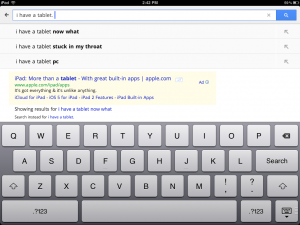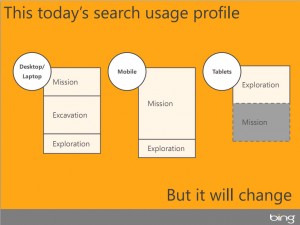What You Need To Know About Targeting iPad & Tablet Searchers
“2012 will be the year of the tablet,” said Kenshoo CMO Aaron Goldman in a recent Search Insider column. With the figures he’s seeing, it’s hard to disagree with him. According to Goldman, 7% of all online sales Kenshoo saw over the holidays came from a tablet, and “Of the sales transactions completed via mobile, […]
“2012 will be the year of the tablet,” said Kenshoo CMO Aaron Goldman in a recent Search Insider column. With the figures he’s seeing, it’s hard to disagree with him.
According to Goldman, 7% of all online sales Kenshoo saw over the holidays came from a tablet, and “Of the sales transactions completed via mobile, over 83% of the revenue was driven through tablets, and overall tablet conversion rate was 2.72%, more than 3x higher the conversion rate for mobile phones.
Additionally, the average order value from tablets ($149.84) actually exceeded that of desktop computers ($146.07).”
On top of that, tablet ownership nearly doubled over the holidays, according to Pew Internet.
With numbers like these, it’s clear that there’s an opportunity for marketers in tablets in 2012. What’s not clear is what marketers need to do to target tablet searchers effectively.
Do tablet owners search? If so, how do they search, what do they search for, and is it different from desktop and/or mobile search? How can content owners and advertisers build content today to effectively engage this highly lucrative tablet segment?
Fortunately, there are some things that we know about tablet owners that can help us get a better sense of what they’re looking for and how to give it to them:
Tablet Owners Are Searchers
Not only do tablet users buy a lot on their tablets, but they search a lot too. According to Google research, tablet owners reported that searching was the second most frequent activity (with 78% of users responding that they search for information on their tablets) behind playing games.
Tablet searchers account for a significant portion of mobile searches, according to Performics, who reported tablet accounts for 34% of mobile impressions on average, and as much as 50% for some advertisers. Marin Software reports that tablet search accounted for 3% of total impressions and 4% of total clicks in the fourth quarter of 2011.
Tablet Search Behavior Is Different
Last week, Resolution Media spent two days with the search engines planning strategy for 2012. And while I can’t talk about most of what was discussed, both Google and Yahoo! made a point of saying that tablet search behavior is different than mobile or desktop search behavior, and that campaigns and ad groups should be separated by platform for the best performance.
Last year at SMX West, Jacquelyn Krones of Bing and Taylor Schreiner of Yahoo! presented research to this end on tablet searchers’ user experience and goals. Krones gave marketers a model for understanding tablet users’ needs based on Mission, Excavation, and Exploration:
Unlike mobile (i.e. smartphone and featurephone) searchers, tablet searchers are not focused on completing a task (Mission), but are instead using the search engines on their devices to find new and interesting content, without really knowing what they are looking to find (Exploration). And neither tablet nor mobile searchers are using their devices for multi-step problem solving (Excavation).
Indeed, a Yahoo! Research/Reprise Media study at that time on mobile and tablet search behavior called “Searching on Glass” indicates that tablet searchers are more likely to search different categories (e.g. Real Estate, Investing, TV/Cable) and less likely to search others (e.g. Insurance, Deposits, Brand) than mobile and PC users.
Tablet users are also searching at different times than mobile and PC users. According to Google research, desktop searchers search during the day, and tablet and mobile searchers search at night. Google later draws the conclusion that desktop and laptop computers are for work, and tablets are more for entertainment at home.
Tablet Searchers Are Not Quite Mobile
A lot of people consider a tablet a mobile device, but research shows that most people aren’t mobile when they’re using it. Most of them are, in fact, on the couch, watching TV, in the kitchen or in bed.
If you’re lumping tablets and smartphones in the same ad group, or serving content created for mobile users to tablet users, you could be serving your customers content they don’t want.
Google (or at least Maile Ohye) recommends serving desktop content to tablet users, as they more closely resemble desktop users than mobile users in terms of behavior; but Adobe says the best option is to build tablet optimized experiences, separate from mobile or desktop sites.
Tablet Searchers Are Not Quite PC Searchers
One reason to build separate experiences rather than providing desktop content to tablet searchers is that tablet searchers aren’t able to access certain technologies that PC users are. The iPad, for example, is the market leader with 58% market share, and none of them run Adobe Flash.
If you’re using Flash to run videos on your site, or if you have a restaurant or other local business that tablet or smartphone users are likely to visit and you have a user experience that relies on Flash, you have two choices in this era of smartphones and tablets:
- get rid of it and build an experience in HTML5 that can be dynamic and accessible to multiple devices, or
- be invisible to the majority of tablet and smartphone users and risk frustrating this large and growing audience and/or losing them as customers.
Tablet Searchers are Looking for…?
It’s strange that all three major search engines tell us that tablet search behavior is different, but give us only desktop keywords in keyword tools to help us develop relevant content.
You can find tablet keywords in analytics, of course.
In Google Analytics, it’s as simple as going to the mobile devices report and then filtering with the following regular expression to isolate popular tablets:
tablet|tab|pad|slate|thinkpad|viewpad|ipad|lifebook|nook|windpad|xoom|xtablet|flybook|g-slate|ideapad|kindle|modbook|multipad|olivepad|paddle|playbook|quadpad|slimbook|t-touch|tuftab
Select the secondary dimension “Keyword” to see what tablet owners are searching for.
The problem with this method, of course, is that you can only see keywords that your site is optimized for, and not keywords that you should be optimized for.
To see that, we want to use a keyword tool, but at the moment the only keyword tool that I know of that includes tablets is the Google Keyword Tool. It’s currently impossible to find popular tablet keywords with it, however, as they’re lumped in with smartphone keywords.
Given that tablet searchers have different needs and search behavior than desktop or mobile searchers, it’s likely that they also use different keywords with different frequencies. The Reprise Media/Yahoo! study hints at that with the different categories that they uncover, but marketers currently can’t do much keyword research on their own without a specific tablet breakout.
My hope is that Google and the other search engines break out tablet queries separately in the Google Keyword Tool and similar tools so that marketers can optimize the user experience based on what tablet searchers are looking for.
Google has optimized their user experience for each platform, so they must understand content owners’ desire to do the same for their users. If you want to join me in this request, please show your support in the Google Adwords Support Forum, where I’ve formally posted this feature request.
Until then, hopefully this information on tablet searchers and their intent gives you a better sense of of what’s necessary to target tablet searchers in this oft-described “year of the tablet”.
Opinions expressed in this article are those of the guest author and not necessarily Search Engine Land. Staff authors are listed here.
Related stories

